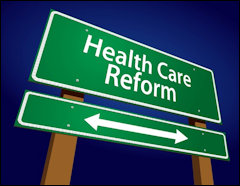Republicans in the General Assembly are dead-set against expanding Medicaid and incurring a new budget-busting fiscal obligation. But what are they for? What solutions do they propose to help the hundreds of thousands of lower-income Virginians who can’t afford medical insurance?
One approach explained yesterday by Del. John O’Bannon, R-Henrico, vice chair of the House Health, Welfare and Institutions Committee, is to strengthen the safety net of free clinics that provide primary care services for the poor and near-poor. One can argue that the state’s commitment to free clinics is insufficient to serve Virginia’s large uninsured population but at least it’s a theoretical alternative to an inflexible Medicaid program that stifles money-saving innovations.
Another approach is to implement market-based reforms to promote competition and transparency in Virginia’s health care sector. The hope is that empowering entrepreneurs and consumers will restrain the relentless cost increases that have made medical treatments so unaffordable to begin with — in effect, treating the disease, not the symptom.
The federal government dominates health care policy in the United States because it makes the rules for Medicare, Medicaid, and the state health care exchanges set up by the Affordable Care Act, which account for more than half of all health care spending. But state laws and regulations shape local health care markets, too.
O’Bannon’s vision is to make Virginia’s health care system more competitive and to empower consumers with more information on the cost of elective procedures. He and like-minded legislators have submitted bills, or likely will, to prune state laws and regulations that buttress special interests and inhibit innovation. Here’s a quick run-down:
Certificate of Public Need. Reforming the Certificate of Public Need process is at the top of O’Bannon’s list. The law, which requires would-be investors to demonstrate a public need for new medical facilities and imaging services, is criticized for protecting the turf of established providers and limiting competition. HB 193 would not eliminate the law entirely but would exempt everything except open-heart surgery, organ transplants and nursing homes from the need for regulatory review.
As concessions to the hospital industry, O’Bannon proposes phasing in the law over tree years to provide a “soft landing.” To avoid the problem of ambulatory surgery centers “cherry picking” the most profitable patients and sticking hospitals with uninsured and low-paying Medicaid patients, new entrants into the market would be required to provide the same level of charity care as established providers. O’Bannon acknowledges that the bill faces stiff resistance but hopes he can negotiate a compromise with hospitals.
Transparency. O’Bannon said he intends to file bill that give health consumers the right to find the price of elective procedures. Consumers facing $1,000 or more in deductibles and/or co-pays should be allowed to shop around and find the best deals. That information should be readily available to hospitals, he said. “Consumers have the right to know what it will cost to get it done.”
Direct primary care. O’Bannon cited the work of another Republican legislator on the topic of “direct primary care,” which allows consumers to contract directly with primary care physicians, bypassing the middleman insurance provider. The American Association of Family Physicians describes it this way:
The direct primary care (DPC) model gives family physicians a meaningful alternative to fee-for-service insurance billing, typically by charging patients a monthly, quarterly, or annual fee (i.e., a retainer) that covers all or most primary care services including clinical, laboratory, and consultative services, and care coordination and comprehensive care management. Because some services are not covered by a retainer, DPC practices often suggest that patients acquire a high-deductible wraparound policy to cover emergencies.
Direct primary care benefits patients by providing substantial savings and a greater degree of access to, and time with, physicians.
This proposed legislation, says O’Bannon, would state explicitly that the contracting parties are exempt from insurance regulations.
Medical licensure. Critics of the health care system have observed that medical licensure creates occupational guilds in which politically powerful professions stake out medical procedures that only they can perform. While justified on the grounds of patient safety, the issue looming doctor shortage makes licensure particularly problematic for physicians. O’Bannon said consideration is being given to the idea of expanding the scope of practice for nurse practitioners and to integrating military medics into the civilian health care system.
Meanwhile, the health care sector is undergoing a revolution as entrepreneurs concoct new applications for information technology. O’Bannon cited the “the patient will see you now” phenomenon in which patients use their smart phones to shop more aggressively for doctors and wearable sensors that can monitor everything from temperature to blood sugar levels. Virginia’s policy, he said, should be to encourage providers to be more flexible in how they adapt to these new technologies.



